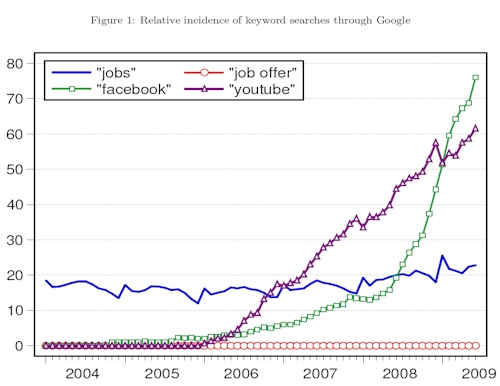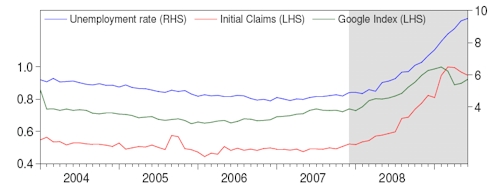Original URL: https://www.theregister.com/2010/05/11/google_unemployment_index/
Google searches divine future unemployment rate
We seek what we lack
Posted in Software, 11th May 2010 15:48 GMT
Google may or may not be great at helping you find a job, but it seems to be as good as some economic models at projecting whether or not you will have a job.
Two researchers affiliated with the Bank of Italy - Juri Marcucci and Francesco D'Amuri, who is also at the Institute for Social and Economic Research at the University of Essex - have put out a paper describing how search data from Google is as good a leading indicator of the future unemployment rate in the United States as the sophisticated computer models that are employed to predict how many people will be losing their jobs in the coming months.
The paper they authored, called Google It!: Forecasting the US Unemployment Rate with A Google Job Search Index, shows with lots of statistics that counting the rate of change in the number of times that people do a search on Google from the US for the word "jobs" is a better indicator of the future monthly unemployment rate than the compiled projections done by individual states or the collection of predictive models used in the Survey of Professional Forecasters.
To create their unemployment rate predictor, the researchers gathered up the Google index for some popular words, like "Facebook" and "Youtube" as well as for "jobs" and "job offers". Here's a graph of the raw data that shows how the searches for the word "jobs" stack up against some other popular terms:

After having gathered up this Google index data on a weekly and monthly basis, they decided that the keyword search term "jobs" was doing something interesting, and so they performed a "deep out-of-sample comparison" with 520 different forecasting models, which are based on all manner of statistics as inputs to try to divine what the future unemployment rate will be. Specifically, what the researchers showed is that between June 2004 and January 2009, when they were collecting Google index data, there is a high correlation between the Initial Claims data coming out of the US Department of Labor (describing the number of people who are applying for unemployment for the first time) and the Google index for the search term "jobs". Check it out:

Marcucci and D'Amuri suggest that the Google index for jobs can be used to augment existing models and improve one, two, and three-month forward looking projections of the US unemployment rate.
Google data has been used in similar ways in recent years, notably in November 2008 when Google itself showed that it could track the spread of the influenza virus by tracking where people were searching for the word "flu". Google shared search data with the Centers for Disease Control for the 2007-2008 flu season and found a reasonably tight correlation between searches for the word flu and the official flu outbreak maps from the CDC. This was called Google Flu Trends.
A whole range of interesting - and ominous - possibilities could present themselves through a collaboration between the Chocolate Factory in Mountain View and Uncle Sam. But thankfully, there is a Chinese wall between Google and the federal government. Oh, wait...
Well, now I'm on the Google smartass index, one step away from the Google political dissident index. ®